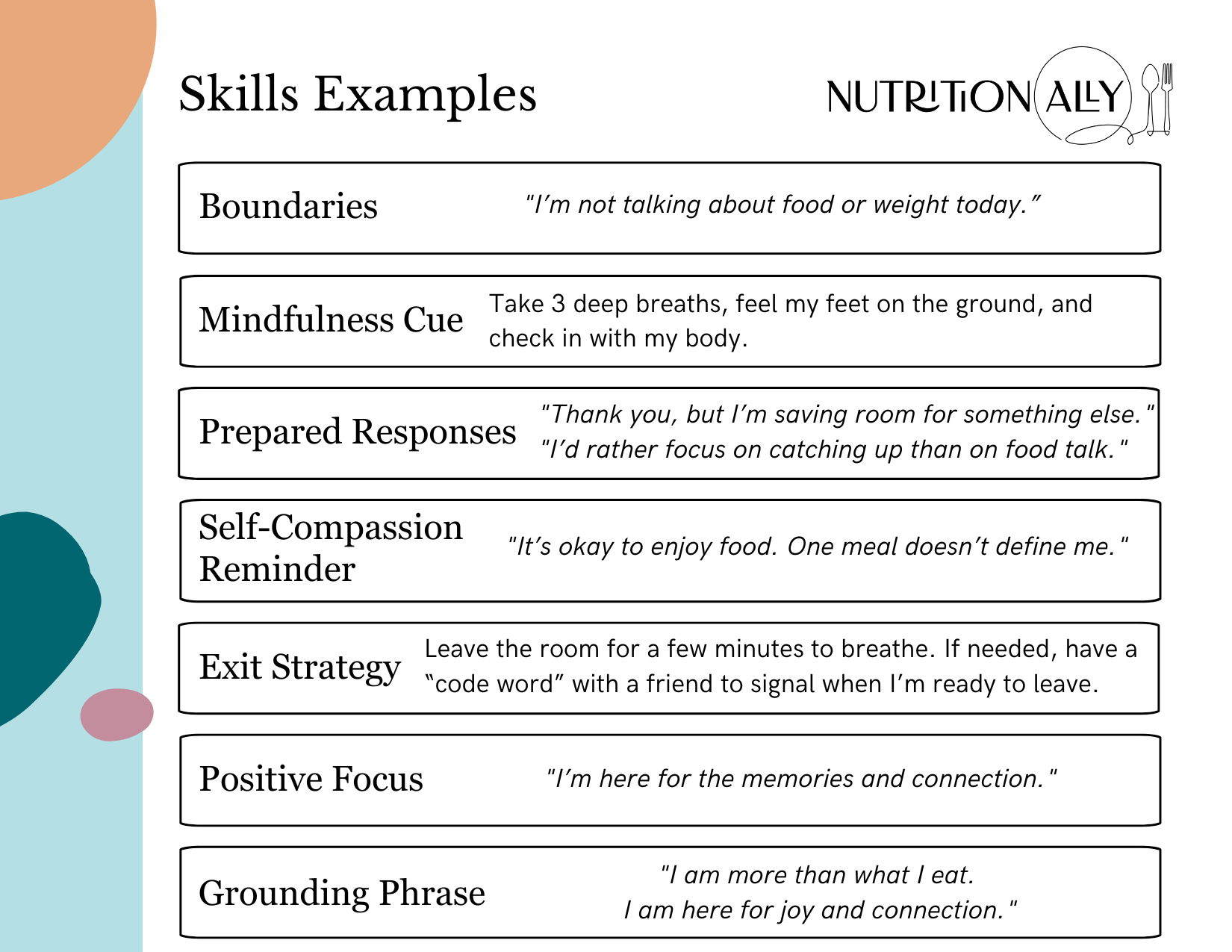How to Handle Holiday Food Challenges: A Guide for Those with Disordered Eating
The holiday season can be one of joy, family, and tradition, but for those with a strained relationship with food, it often brings unique challenges. Surrounded by food-centric gatherings and social expectations, this time can intensify feelings of anxiety, guilt, and overwhelm around eating. Family gatherings may also bring unsolicited comments on appearance or food choices, which can be triggering for someone struggling with disordered eating.
In this post, we’ll discuss why the holidays can be a difficult time for those with food-related challenges and offer practical strategies to support a more positive experience during gatherings. Plus, we have a free downloadable "Cope Ahead" card to help you navigate these moments with confidence.
Why Holiday Meals Can Be Challenging
Increased Attention on Food and Eating
Holiday gatherings often center around meals, making food choices more visible. For someone who may be managing disordered eating, this added focus can be overwhelming.Food Rules and Restrictions
Holiday dishes might not fit within the boundaries someone has set for themselves or that they feel they "should" follow, leading to feelings of guilt or loss of control.Comments on Appearance or Eating Habits
Family members may unintentionally make triggering comments like "You look good; have you lost weight?" or "Should you be eating that?" Such remarks can reinforce self-critical thoughts.Break from Routine
The holiday season can disrupt daily routines, which are often essential for people working to maintain a balanced approach to eating. Shifts in structure can make it harder to manage regular meals and snacks, contributing to stress and even binge eating.Expectations Around "Special" Foods
Holiday dishes may come with social pressure to partake or to eat "just a little." For someone with a strained relationship with food, these expectations can lead to feelings of anxiety and guilt.
10 Strategies for Navigating Holiday Gatherings
Set Boundaries for Conversations
If comments on food, weight, or appearance feel triggering, practice setting boundaries. A gentle response like, "I’m focusing on enjoying time with family, so I’m not talking about food or weight right now," can be helpful.Practice Mindfulness
Grounding exercises like deep breathing can help you stay present. Try tuning into all five senses when you feel anxious: observe the colors, sounds, and textures around you, which can shift your focus from internal stress to your surroundings.Bring a Supportive Buddy
If possible, bring along a friend or family member who understands your needs. Having someone by your side who knows your boundaries can help you feel supported and may even redirect uncomfortable conversations.Prepare Responses to Food Pressure
Anticipate common remarks like “You have to try this!” and prepare responses that politely decline or redirect. You might say, “Thank you, it looks delicious, but I’m not up for it right now,” or "I’m saving room for [another dish]."Stick to a Meal Pattern
Keeping a regular meal schedule can help stabilize your mood and blood sugar, reducing the urge to overeat later. Arriving at the gathering hungry but not ravenous can help you feel more in control around food.Prioritize Self-Compassion
Be gentle with yourself if you feel you’ve "messed up" with food. Remind yourself that one meal doesn’t define your relationship with food and that holiday indulgences are part of the experience.Visualize the Event and Plan Ahead
Take a few moments to imagine what the gathering will be like, who will be there, and what might trigger you. This "cope ahead" strategy allows you to prepare for the meal with calm responses and coping tools.Engage in Non-Food Activities
To minimize food-centric anxiety, find other ways to connect. Joining in on games, holiday crafts, or simply talking with loved ones can help shift the focus from food.Limit Time if Needed
It’s okay to plan an exit strategy if the gathering becomes overwhelming. Having a pre-planned "out" can provide comfort and give you a sense of control over the environment.Focus on Gratitude and Moments of Joy
Reflecting on non-food aspects of the holiday can help center your experience around what truly matters. Focusing on gratitude for loved ones or moments of connection can ease food-related anxiety.
Free Download: Your "Cope Ahead" Card Template
To help you stay grounded and prepared, we’re offering a free downloadable "Cope Ahead" card. This card serves as a quick-reference tool to remind you of your personal strategies, set boundaries, and support self-compassion during holiday gatherings.
Download the Free Template for Your Cope Ahead Card:



